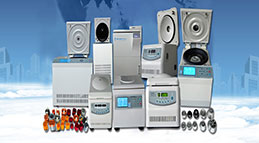Ⅰ. Refrigerated centrifuge
Generally, the speed of the centrifuge with refrigeration is not too high, and the lowest temperature that can be reached is about -10 to -20 degrees. The centrifuge machine is mostly used to collect microorganisms, cell debris, cells, large organelles, sulfuric acid precipitates and immunoprecipitates, etc.
Ⅱ. In order to ensure the speed of the refrigerated centrifuge, you should be familiar with the following:
1. After centrifugation, the water in the centrifugal chamber should be wiped dry, and a little neutral lubricating grease should be applied to the cone surface of the motor spindle every week to prevent the shaft from rusting. If the centrifuge machine is not used for a long time, the rotor should be taken out, wiped clean and placed in a dry place to prevent corrosion.
2. The main power plug should be removed when the instrument is not used for a long time or for maintenance. Otherwise, the instrument will be electrified, and safety accidents are likely to occur during maintenance.
3. In order to protect the refrigeration compressor of the refrigerated centrifuge machine, the interval between disconnection and power-on of the instrument must be greater than 3 minutes, otherwise the compressor will be damaged.
4. When the rotor is not in use, it should be taken out of the centrifugal chamber, cleaned and dried with neutral detergent in time to prevent chemical corrosion, and stored in a dry and ventilated place. It is not allowed to scrub the rotor with non-neutral detergent, and it is not allowed to dry the rotor with electric hot air. A little grease should be applied to the center hole of the rotor to protect it.
5. In order to ensure the freezing effect, when the ambient temperature is higher than 30℃, the rotor and centrifugal chamber should be pre-cooled, and the rotor should also be operated at a reduced speed of 15%.
6. The centrifuge tube should be updated regularly, and it is strictly prohibited to use the centrifuge tube on the verge of rupture.
7. Before each use, check the rotor for corrosion points and micro cracks. It is forbidden to use corroded or cracked rotors, and use rotors that have exceeded the shelf life to ensure personal safety.
8. When using the centrifuge rotor, make sure that the rotor number is correct. If the rotor number is set incorrectly, it will cause the rotor to be used over-speed or fail to achieve the desired centrifugal effect. In particular, the vicious accident of the rotor bursting may occur when it is used with an excessive speed, so you must not be negligent.
9. Polypropylene (PP) centrifuge tubes (bottles) cannot be used in contact with aqua regia, toluene, benzene, gasoline, kerosene, etc. The ultra-clean workbench polycarbonate (PC) centrifuge tube (bottle) cannot be used with hydrofluoric acid, hydrochloric acid (30%, 50%), sulfuric acid (10%), potassium hydroxide, magnesium hydroxide, ammonium hydroxide, aluminum fluoride, ammonium sulfide, ammonium acetate, ammonium carbonate, chromic acid (50%), toluene, benzene, gasoline, acetaldehyde, acetone, ethanol, isobutanol, cresol, etc. Polyethylene (PE) centrifuge tubes (bottles) cannot be used in contact with sulfuric acid (50%, 75%), benzene, gasoline, kerosene, etc.
Hot Scientific Instrument Recommendation

Nine Maintenance Methods for Refrigerated Centrifuges to Help You Extend the Life of the Instrument
Mar 22,2021
Several Methods of the Centrifugation of High Speed Centrifuge
Mar 08,2021
The Difference between High Speed Centrifuge and Low Speed Centrifuge
Mar 15,2021
Welcome your presence! You can send us an email to know more about our medical laboratory equipments. We will get in touch with you within 24 hours.